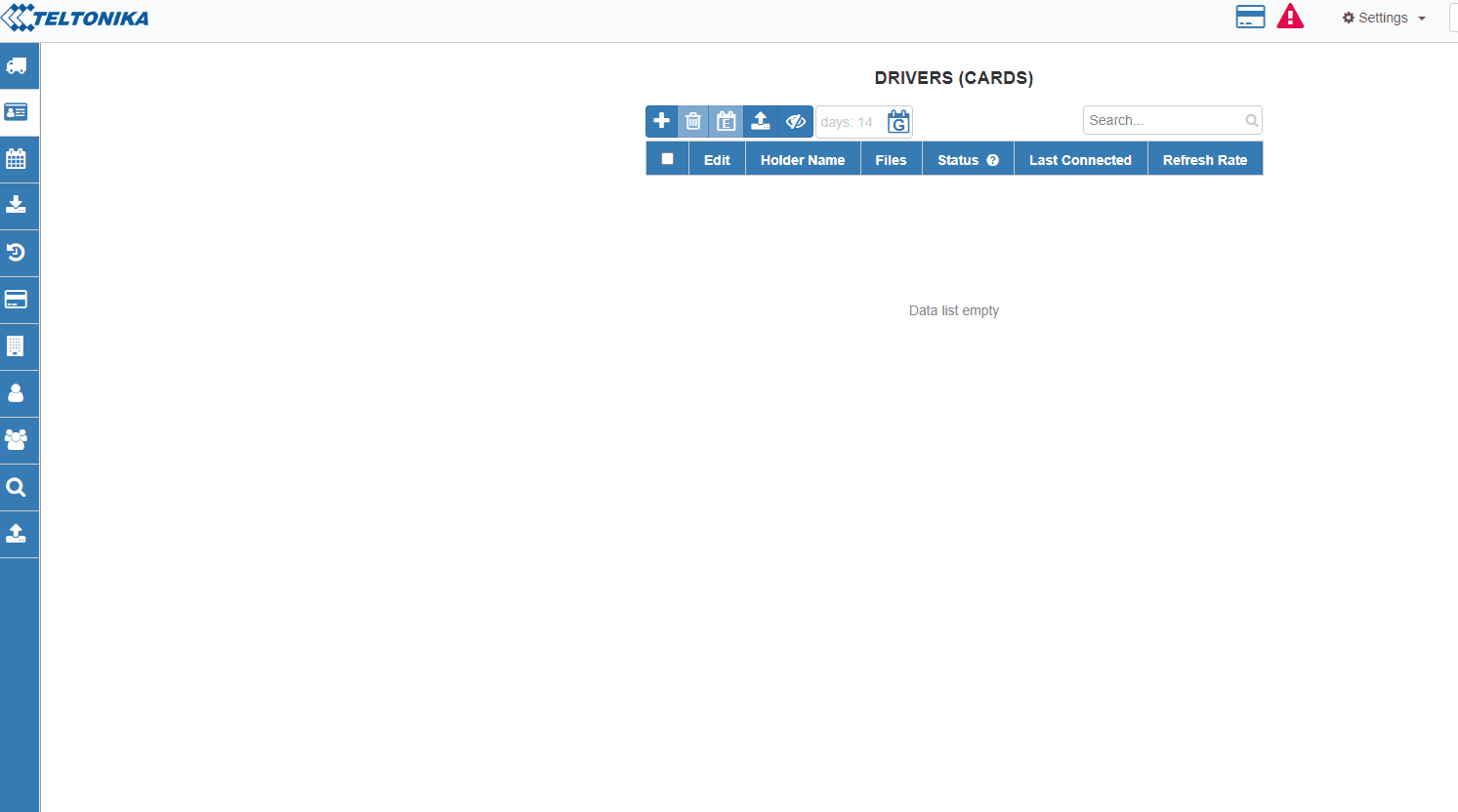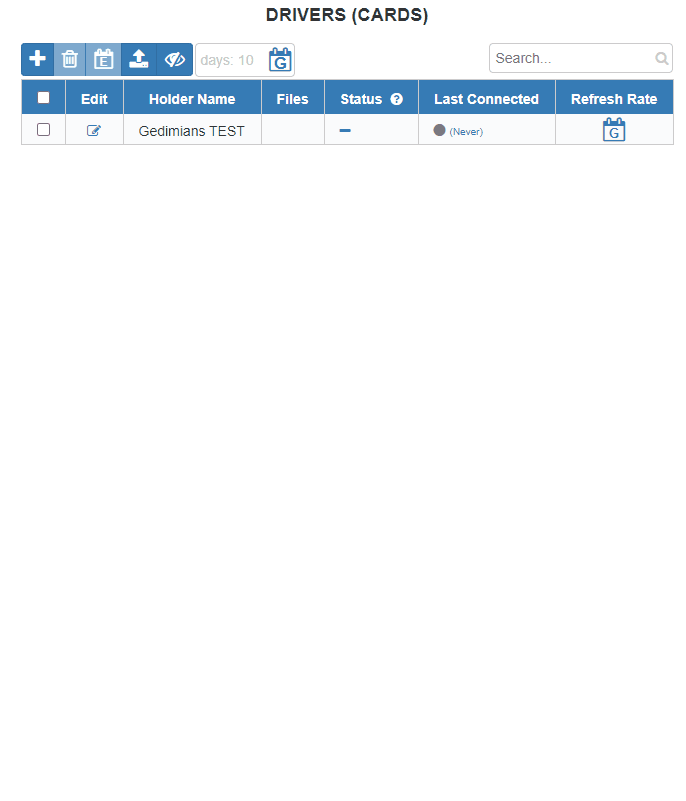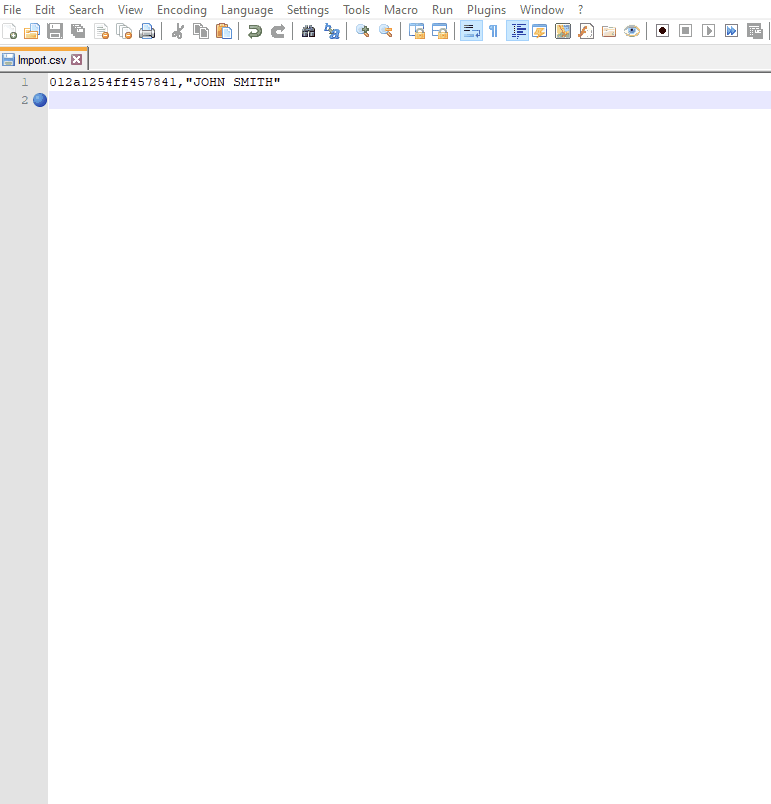WEB Tacho Drivers Cards: Difference between revisions
No edit summary |
|||
| (20 intermediate revisions by 2 users not shown) | |||
| Line 1: | Line 1: | ||
A brand new and exciting solution for remote downloading Driver card data from tachograph! <br> | |||
WEB Tacho with "Drivers Cards" functionality enables FMX640 devices to download each '''Driver Card''' data every time a different '''Driver Card''' is inserted into the tachograph. The solution allows more simplified scheduling - you do not need to create multiple schedules to try to download different driver card data for different drivers. | |||
===Drivers Cards=== | ===Drivers Cards=== | ||
The new schedule logic for the driver's cards is added to the '''TACHO | The new schedule logic for the driver's cards is added to the '''WEB TACHO''' solution. Solution '''ONLY''' works with Teltonika FMX640 (FMB640, FMC640, FMM640) tracker that have '''01.00.13''' or newer firmware installed. | ||
A new type of tab is created called “Driver cards”. All units in this tab are not tied down to device IMEI like vehicle units, but to separate | A new type of tab is created called “Driver cards”. All units in this tab are not tied down to device IMEI like vehicle units, but to separate drivers cards. | ||
[[image:TACHO_WEB_DRIVERS1.png|center]] | [[image:TACHO_WEB_DRIVERS1.png|center]] | ||
==Global/Specific types== | ==Global/Specific types== | ||
| Line 22: | Line 20: | ||
'''How to change Global refresh rate:''' | '''How to change Global refresh rate:''' | ||
[[image:TachoWEB_global.gif | [[image:TachoWEB_global.gif]] | ||
<br><br> | <br><br> | ||
* Specific – same as global, but the parameter is set on every driver card unit separately. | * The Specific – same as global, but the parameter is set on every driver card unit separately. | ||
The global refresh rate will be marked as [[image:TachoWEB_spec.gif]] | The global refresh rate will be marked as [[image:TachoWEB_spec.gif]] | ||
| Line 32: | Line 30: | ||
==Adding Driver ID== | ==Adding Driver ID== | ||
When adding Driver ID to the Tacho | When adding Driver ID to the WEB Tacho system, Driver's Name and Driver's ID must be specified | ||
* Driver ID must be exactly '''16 characters''' in length. | * Driver ID must be exactly '''16 characters''' in length. | ||
[[image:TachoWEB_add_driver.gif| | [[image:TachoWEB_add_driver.gif|center]] | ||
There will be 3 ways to add a new Driver card unit: | |||
# By adding one by one Driver card unit; | |||
# By adding multiple Driver card units [[WEB_Tacho_Drivers_Cards#Importing_Driver_Cards_from_.2A.CSV_file|via .csv file]] | |||
# Automatically added by the system, if FMX640 connects to WEB Tacho (identified by IMEI to the specific company) with new driver Card ID which is not registered to driver cards. | |||
## Newly added driver card unit has a global file refresh rate, and download initiated instantly after registering card to list. | |||
==Importing Driver Cards from *.CSV file== | ==Importing Driver Cards from *.CSV file== | ||
In order to add multiple Driver Cards to | In order to add multiple Driver Cards to WEB Tacho, "import using .CSV" can be used. | ||
CSF file data should contain: | CSF file data should contain: | ||
| Line 46: | Line 50: | ||
# Holder's Name | # Holder's Name | ||
For example: (e.g: 012a1254ff457841;"JOGH SMITH"). Expected data fiems delimiters: | For example: (e.g: 012a1254ff457841;"JOGH SMITH"). Expected data fiems delimiters: comma or semicolon. | ||
</br> | |||
Example .CSV file can be downloaded from here: [[File:Download_zip.png|x30px|link=Special:Redirect/file/Import.zip]] | |||
</br> | |||
[[image:TachoWEB_addrivercsv.gif]] | [[image:TachoWEB_addrivercsv.gif]] | ||
[[Category:WEB Tacho]] | [[Category:WEB Tacho]] | ||
Latest revision as of 15:20, 19 May 2021
Main Page > Software & Applications > WEB Tacho > WEB Tacho Drivers CardsA brand new and exciting solution for remote downloading Driver card data from tachograph!
WEB Tacho with "Drivers Cards" functionality enables FMX640 devices to download each Driver Card data every time a different Driver Card is inserted into the tachograph. The solution allows more simplified scheduling - you do not need to create multiple schedules to try to download different driver card data for different drivers.
Drivers Cards
The new schedule logic for the driver's cards is added to the WEB TACHO solution. Solution ONLY works with Teltonika FMX640 (FMB640, FMC640, FMM640) tracker that have 01.00.13 or newer firmware installed.
A new type of tab is created called “Driver cards”. All units in this tab are not tied down to device IMEI like vehicle units, but to separate drivers cards.

Global/Specific types
Driver card units will have two types of file refresh rate:
- Global – the time period in days, which describes how often new files should be downloaded. The global period should be configured on-page, but not device separately.
The global refresh rate will be marked as ![]()
How to change Global refresh rate:
- The Specific – same as global, but the parameter is set on every driver card unit separately.
The global refresh rate will be marked as ![]()
The global schedule is set to all Driver card units at once. If the user wants to change download frequency for a specific driver, he can do that by editing the Driver card unit.
Adding Driver ID
When adding Driver ID to the WEB Tacho system, Driver's Name and Driver's ID must be specified
- Driver ID must be exactly 16 characters in length.

There will be 3 ways to add a new Driver card unit:
- By adding one by one Driver card unit;
- By adding multiple Driver card units via .csv file
- Automatically added by the system, if FMX640 connects to WEB Tacho (identified by IMEI to the specific company) with new driver Card ID which is not registered to driver cards.
- Newly added driver card unit has a global file refresh rate, and download initiated instantly after registering card to list.
Importing Driver Cards from *.CSV file
In order to add multiple Driver Cards to WEB Tacho, "import using .CSV" can be used.
CSF file data should contain:
- Card Number
- Holder's Name
For example: (e.g: 012a1254ff457841;"JOGH SMITH"). Expected data fiems delimiters: comma or semicolon.
Example .CSV file can be downloaded from here: ![]()


